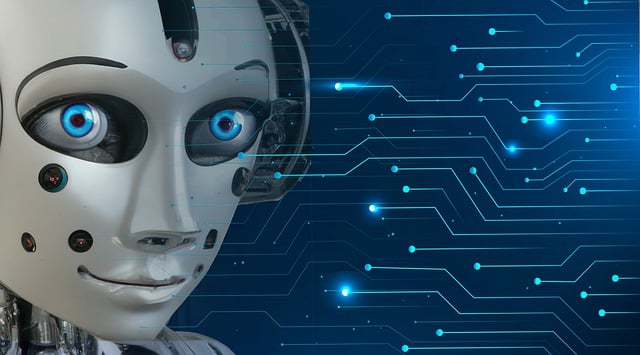AI chatbots, powered by NLP and machine learning, transform customer service, education, healthcare, and entertainment with 24/7 support, cost savings, and personalized experiences. Generative AI models enable these ochatbots to engage in dynamic conversations, tell stories, and collaborate on content creation. While challenges like data quality, privacy, and bias remain, ethical considerations are crucial for their responsible deployment. AI chatbots enhance user experiences and revolutionize industries, from retail and education to healthcare, continuously learning and adapting.
“Unveiling the transformative power of AI chatbots and generative AI, this comprehensive guide explores cutting-edge advancements in artificial intelligence. From understanding the functionality and diverse applications of AI chatbots to delving into the creative potential of language models, we navigate the past, present, and future trends shaping this dynamic field.
We analyze the benefits and challenges of integrating AI chatbots into customer service, dissect ethical considerations, and highlight compelling use cases where ochatbots are revolutionizing industries.”
- Understanding AI Chatbots: Their Functionality and Applications
- Generative AI: Unlocking Creative Possibilities with Language Models
- The Evolution of Ochatbot Technology: Past, Present, and Future Trends
- Benefits and Challenges: Implementing AI Chatbots in Customer Service
- Ethical Considerations in AI-Driven Conversations
- Exploring Use Cases: Where AI Chatbots are Making an Impact
Understanding AI Chatbots: Their Functionality and Applications

AI chatbots are advanced digital assistants designed to mimic human conversation through natural language processing (NLP). They leverage machine learning algorithms to understand user inputs, generate contextually relevant responses, and learn from each interaction, continuously improving their performance. AI chatbots can be integrated into various platforms such as websites, mobile apps, and messaging services, providing 24/7 support for diverse applications like customer service, education, healthcare, and entertainment.
These chatbots offer numerous benefits, including enhanced user experiences, cost savings through automation, and improved accessibility. They can handle a wide range of tasks, from answering frequently asked questions to booking appointments, scheduling meetings, and providing personalized recommendations. Moreover, generative AI enhances chatbot capabilities by enabling them to create original content like text, images, and even code, expanding their utility and opening up new possibilities across industries.
Generative AI: Unlocking Creative Possibilities with Language Models

Generative AI represents a groundbreaking leap forward in the capabilities of artificial intelligence, particularly with advanced language models. These models have been trained on vast amounts of text data, enabling them to create human-like content, from writing and art to code and music. The potential applications are immense, especially for ochatbots designed to engage in complex conversations.
By leveraging generative AI, AI chatbots can offer more dynamic and creative interactions, going beyond simple question-answering. They can generate personalized responses, tell captivating stories, or even collaborate with users to co-create content. This not only enhances the user experience but also opens up exciting possibilities for content generation, innovation, and artistic expression in the realm of AI technology.
The Evolution of Ochatbot Technology: Past, Present, and Future Trends

The evolution of AI chatbot technology has been a remarkable journey from simple rule-based systems to sophisticated generative models. Historically, early ochatbots were designed to mimic basic conversational patterns, often relying on predefined responses and limited context understanding. These pioneers laid the foundation for more advanced systems by demonstrating the potential for machine learning to enhance user interactions.
Today, AI chatbots have reached new heights with the advent of Generative AI. They can now engage in complex, human-like conversations by generating text based on vast amounts of data. This technology enables dynamic and personalized responses, allowing ochatbots to assist users across diverse sectors, from customer service to creative content generation. Looking ahead, future trends suggest further integration of natural language processing, improved context awareness, and enhanced emotion recognition, pushing the boundaries of what AI chatbots can achieve.
Benefits and Challenges: Implementing AI Chatbots in Customer Service

Implementing AI chatbots in customer service offers significant benefits such as 24/7 availability, instant response times, and cost-effectiveness. These virtual assistants can handle a high volume of simple to moderately complex queries, freeing up human agents to focus on more intricate issues that require empathy and nuanced understanding. Moreover, AI chatbots can be easily integrated into existing systems and platforms, enhancing customer experience through personalized interactions and quick issue resolution.
However, challenges remain when deploying AI chatbots in customer service. Ensuring the chatbot provides accurate and contextually relevant responses is crucial for maintaining customer satisfaction. Training data quality and bias play a significant role in this regard, as poor training data can lead to incorrect or offensive outputs. Additionally, handling sensitive information responsibly, maintaining data privacy, and addressing ethical considerations surrounding AI decision-making are paramount.
Ethical Considerations in AI-Driven Conversations

As AI chatbots and generative AI continue to evolve, it’s crucial to address the ethical considerations that come with their widespread use. These technologies, while powerful, raise concerns about privacy, data security, and the potential for bias or misinformation. For instance, ochatbots can inadvertently perpetuate stereotypes or reproduce harmful language patterns present in their training data. Additionally, the ability to generate convincing text or voices can be misused for phishing scams, deepfakes, or other malicious activities.
Guiding principles and regulations are essential to ensure that AI chatbots operate responsibly. This includes transparent data handling practices, user consent, and mechanisms to hold developers accountable for the integrity of their models. Moreover, ongoing monitoring and evaluation of AI chatbot responses can help identify and mitigate ethical pitfalls. By fostering a balanced approach that leverages the benefits of AI while mitigating risks, we can create a future where these technologies enhance human interaction without compromising core values like trust, fairness, and respect for user privacy.
Exploring Use Cases: Where AI Chatbots are Making an Impact

AI chatbots are transforming various industries and sectors with their versatility and adaptability. From customer service to healthcare, these intelligent agents are enhancing user experiences and streamlining processes. In the retail sector, for instance, AI chatbots can provide personalized product recommendations, answer queries, and even facilitate purchases, all while learning from each interaction to improve their performance.
In the field of education, ochatbots can act as virtual tutors, offering tailored study assistance and feedback. They can also assist in administrative tasks, freeing up educators’ time for more meaningful interactions with students. Additionally, AI chatbots are making significant strides in healthcare, where they can help patients schedule appointments, provide initial assessments, and offer guidance on common health issues, thereby improving access to care and reducing the burden on medical professionals.
AI chatbots and generative AI are transforming various industries, from customer service to content creation. As ochatbot technology continues to evolve, it’s crucial to balance the benefits against ethical considerations. By understanding their functionality, exploring use cases, and addressing challenges, businesses can harness the power of AI chatbots to enhance user experiences while ensuring responsible development and deployment.
